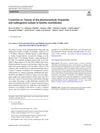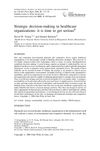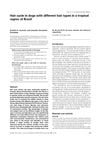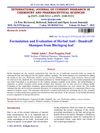 November 2020 in “Environmental Science and Pollution Research”
November 2020 in “Environmental Science and Pollution Research” Finasteride and melengestrol acetate are toxic to benthic invertebrates.
 June 2023 in “International journal on recent and innovation trends in computing and communication”
June 2023 in “International journal on recent and innovation trends in computing and communication” Combining multiple algorithms predicts hair fall more accurately than using single algorithms.
 January 2025 in “Journal of Personalized Medicine”
January 2025 in “Journal of Personalized Medicine” People with Alopecia Areata are more likely to have prediabetes and obesity.
 May 2023 in “Advances in medicine”
May 2023 in “Advances in medicine” Alopecia areata significantly impacts patients' mental health and quality of life.
 3 citations,
March 2019 in “Post Reproductive Health”
3 citations,
March 2019 in “Post Reproductive Health” Testosterone replacement can help menopausal women with various symptoms, but should be used carefully and is not yet officially licensed in the UK for women.
 28 citations,
October 2018 in “Clinical Obstetrics and Gynecology”
28 citations,
October 2018 in “Clinical Obstetrics and Gynecology” Testosterone therapy seems safe and effective for transgender men with proper care, but more long-term research is needed.
 1 citations,
January 2023 in “Journal of Clinical Medicine”
1 citations,
January 2023 in “Journal of Clinical Medicine” A new hair restoration technology was found to effectively increase hair thickness, density, and growth, while reducing hair loss and improving scalp health, with no side effects.
 20 citations,
August 2018 in “Clinics in Dermatology”
20 citations,
August 2018 in “Clinics in Dermatology” The conclusion is that understanding and addressing the psychological effects of alopecia areata is important for effective treatment.
 69 citations,
November 2010 in “Middle East Fertility Society Journal”
69 citations,
November 2010 in “Middle East Fertility Society Journal” PCOS affects women's health by increasing the risk of diabetes, heart disease, and reproductive issues.
4 citations,
November 2017 in “PubMed” Miracle fruit seed oil significantly reduces hair breakage in women with damaged hair.
 January 2011 in “Springer eBooks”
January 2011 in “Springer eBooks” Eating a balanced diet with the right vitamins and minerals is important for healthy hair, but too many supplements can be harmful.
 1 citations,
October 2017 in “Elsevier eBooks”
1 citations,
October 2017 in “Elsevier eBooks” Antiandrogens can treat female hormonal conditions, but environmental ones may harm reproductive health.
 16 citations,
November 2018 in “Singapore Medical Journal”
16 citations,
November 2018 in “Singapore Medical Journal” Primary care for PCOS focuses on lifestyle changes, medication based on symptoms, and mental health, with diabetes screening and specialist referral for severe cases.
 13 citations,
February 2020 in “Clinical, Cosmetic and Investigational Dermatology”
13 citations,
February 2020 in “Clinical, Cosmetic and Investigational Dermatology” Men with hair loss have higher BMI, waist size, blood pressure, and are linked to smoking and inactivity.
 October 2023 in “The Open public health journal”
October 2023 in “The Open public health journal” Alopecia greatly affects Greek women's daily life, relationships, and self-image, with mixed social support and dissatisfaction with treatments.
 May 2010 in “Current Women's Health Reviews”
May 2010 in “Current Women's Health Reviews” The document concludes that early diagnosis and treatment of PCOS in teenagers is important for managing symptoms and preventing long-term health problems.
 2 citations,
June 2020 in “Journal of Drug Delivery and Therapeutics”
2 citations,
June 2020 in “Journal of Drug Delivery and Therapeutics” The document concludes that understanding hair problems can lead to cost-effective solutions and proper treatment choices.
 17 citations,
July 2006 in “The International Journal of Health Planning and Management”
17 citations,
July 2006 in “The International Journal of Health Planning and Management” Healthcare organizations must seriously focus on strategic decision-making to succeed in a complex market.
 10 citations,
September 2020 in “Computational and Mathematical Methods in Medicine”
10 citations,
September 2020 in “Computational and Mathematical Methods in Medicine” Researchers developed an algorithm for self-diagnosing scalp conditions with high accuracy using smart device-attached microscopes.
1 citations,
January 2015 in “Elsevier eBooks” Certain pesticides and fungicides can interfere with male hormone functions, potentially causing reproductive issues in male rats.
 January 2019 in “Advances in stem cells and their niches”
January 2019 in “Advances in stem cells and their niches” Skin health and repair depend on the signals between skin stem cells and their surrounding cells.
 25 citations,
September 2014 in “Biological Research”
25 citations,
September 2014 in “Biological Research” Arctiin helps protect hair cells from damage and death caused by oxidative stress.
 9 citations,
November 2007 in “Veterinary dermatology”
9 citations,
November 2007 in “Veterinary dermatology” Boxer and Labrador dogs' hair growth is affected by the tropical climate, but Schnauzers' is not.
 July 2023 in “International journal of current research in chemistry and pharmaceutical sciences”
July 2023 in “International journal of current research in chemistry and pharmaceutical sciences” The shampoo made with Bhringraj leaf and other natural ingredients shows promise as a natural dandruff solution.
 96 citations,
July 2014 in “Cold Spring Harbor Perspectives in Medicine”
96 citations,
July 2014 in “Cold Spring Harbor Perspectives in Medicine” The document concludes that adult mammalian skin contains multiple stem cell populations with specific markers, important for understanding skin regeneration and related conditions.
 September 2023 in “Current opinion in microbiology”
September 2023 in “Current opinion in microbiology” Certain fungi protect skin health, but changes can allow harmful fungi to cause serious infections, needing more research for treatment and control.
 84 citations,
April 2013 in “Applied Microbiology and Biotechnology”
84 citations,
April 2013 in “Applied Microbiology and Biotechnology” Mannosylerythritol lipids are good for skin and hair care products.
 April 2023 in “Acta Poloniae Pharmaceutica”
April 2023 in “Acta Poloniae Pharmaceutica” Herbal extract shampoo increased certain minerals in hair and improved hair growth and scalp health.
40 citations,
July 2016 in “Pediatrics in review” Puberty involves complex hormonal changes, varies by gender and ethnicity, and requires careful monitoring for abnormalities.
 7 citations,
January 2017 in “Journal of cosmetology & trichology”
7 citations,
January 2017 in “Journal of cosmetology & trichology” Good nutrition is crucial for healthy hair and can help with hair loss without medication.



























